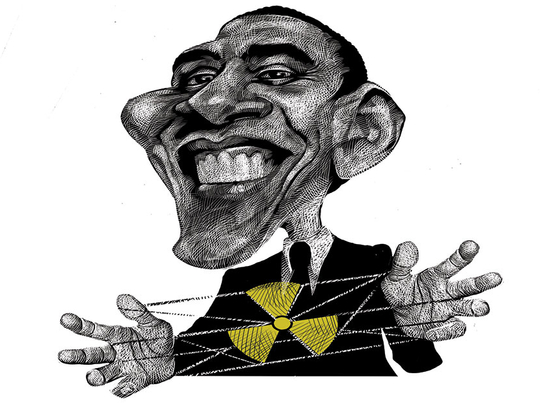
The interlocking technicalities of the Iran nuclear deal have obscured the underlying fact that all sides made an immense political commitment to get the deal done. The politicians on both sides will be determined to play down the true political potential of the new situation as they argue the deal through the obstacles of their various domestic ratifications and implementations.
Iranian President Hassan Rouhani will want to get at least the first round of sanctions lifted and some quantifiable economic benefits flowing into his country before he makes a more wide ranging case for international engagement.
United States President Barack Obama has been explicit in refusing to be judged on whether the deal will transform Iran or end its interference in the affairs of its Arab neighbours and insists that the deal should be judged solely on whether it will stop Iran getting a nuclear weapon for the next 10 years.
Obama told Thomas L. Friedman of the New York Times that “We are not measuring this deal by whether it is changing the regime inside of Iran ... whether we are eliminating all their nefarious activities around the globe. We are measuring this deal by how Iran could not get a nuclear weapon”. It is obviously much easier for the president to face Congress arguing on this narrow point, since it is the heart of the deal, clearly measureable, and no-one wants Iran to have nuclear weapons. Also no-one in Washington is a natural ally of Tehran where Iran has been demonised for decades and there are no political gains to be made by being a friend of Iran, especially during an election campaign.
Reality-based strategy
But all this immediate political positioning does not stop the long term potential. The experienced American observer of Iran, Flynt Leverett, commented in Democracy Now! from Vienna, just as the deal was being announced, that the deal could allow the US to “abandon its increasingly self-damaging quest to dominate the Middle East and adopt a more reality-based strategy towards this critical part of the world; finally accept the Islamic Republic of Iran as a legitimate political order representing legitimate national interests; and for its own interests replace its longstanding reliance on Israel and Saudi Arabia with a more balanced approach characterised by strategically-grounded diplomacy with all major regional players”.
Obama does not agree with this condemnation of America’s existing allies, but for domestic and tactical reasons he will not want to consider Iran as a potential close ally. He will concentrate on arguing the case for the deal as both houses of Congress take 60 days to review the agreement. The Israelis and others who want to wreck the deal will be working very hard to turn public opinion against it and win as many votes as they can. Even if the votes are not binding on the administration, a larger vote will give the deal’s opponents more legitimacy. But even if Congress passes a resolution of disapproval, Obama will veto it and the deal will go through.
Tectonic shift
But despite all the immediate emphasis on the narrow issue of arms control, the deal has much wider implications. It is going to be the major international part of Obama’s legacy as a president. He will want to use this moment of history to show he is not all rhetoric and no action, but if he is to claim this moment as his, he will have to change his style on Iran and claim the larger prize.
For now, he will stick to the limited argument of arms control but for his own political benefit, Obama will need to argue positively for the wider benefits of the deal. He will certainly not want to argue that the US should use this moment to replace Israel and Saudi Arabia as its leading allies in the region with a more rational Iran. Obama, US Secretary of State John Kerry, Secretary of Defence Ash Carter and his predecessor Chuck Hagel have gone out of their way to reassure the worried Saudis that this deal does not mean that the US will dump Saudi Arabia. It is important to note that the same level of reassurance has not been offered to Netanyahu’s arrogant and nationalistic Israeli government, other than ritualistic support for the state of Israel.
But Obama does need to grab control of his one major foreign policy breakthrough, especially because it is one that has eluded successive previous presidents. He needs to show that dialogue and negotiation can succeed as the world becomes ever more wrapped up in nationalistic violence and ethnic politics. This is his moment to show that a multi-polar world can work and is worth fighting for, and that this can benefit the US as well as the rest of the world.
It will be an interesting test of Obama’s mettle to see if success can replace the timid president that we have had to get used to with the fiery visionary that we all liked when he was campaigning and had just been elected.









